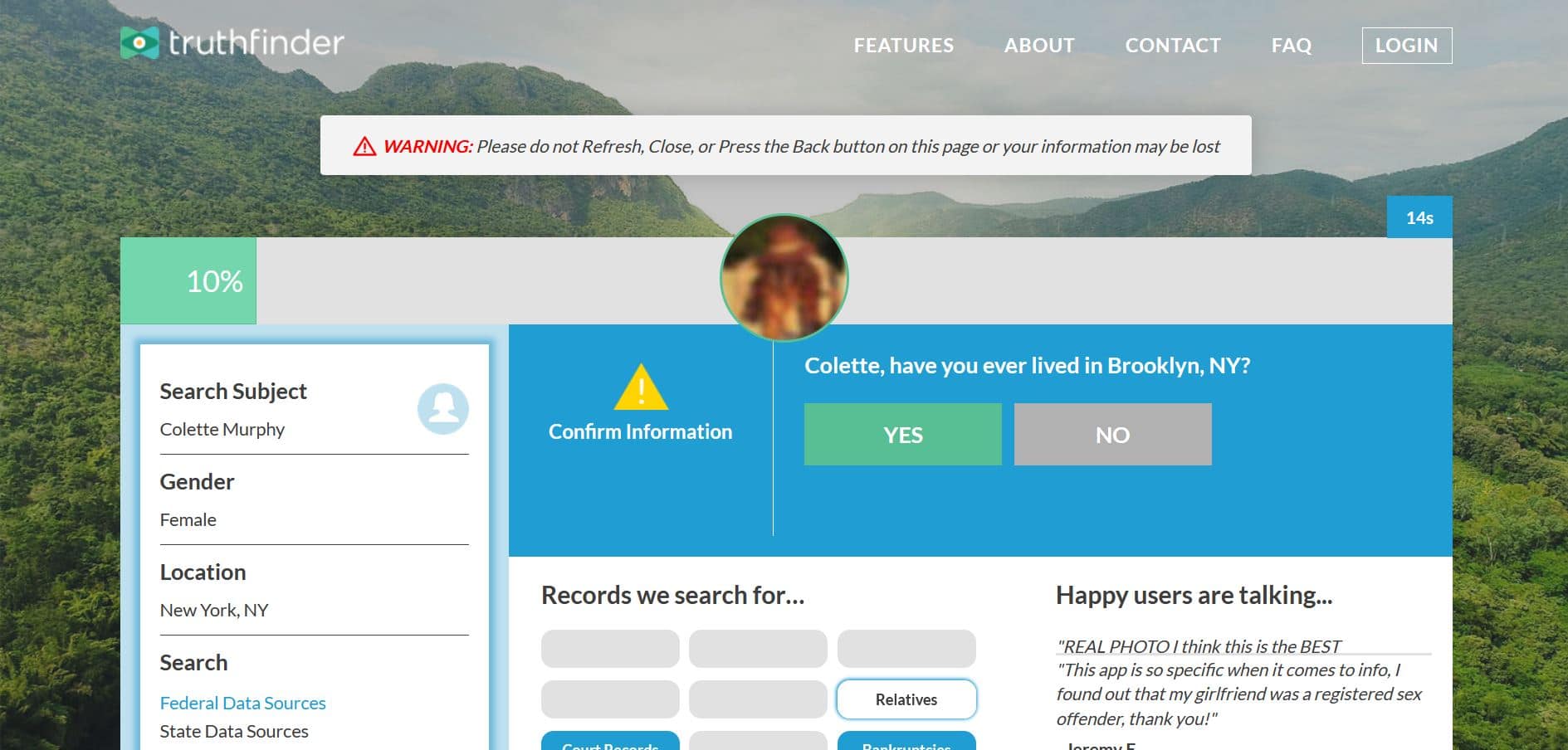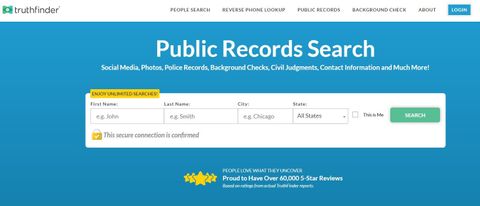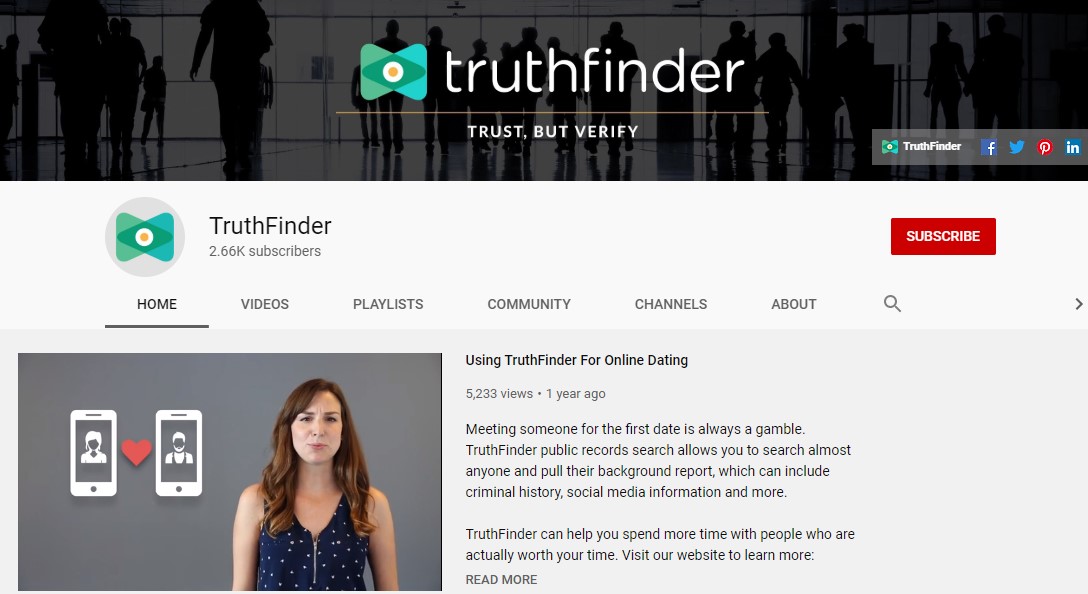What is TruthFinder and How Does it Work?
TruthFinder is a people search website that claims to provide users with access to a vast database of public records, allowing them to find information about individuals. The website promises to deliver accurate and up-to-date results, including contact information, addresses, and social media profiles. With the rise of online people search services, TruthFinder has become a popular choice for those seeking to reconnect with old friends, research potential employees, or simply satisfy their curiosity about someone.
People search websites like TruthFinder have gained significant traction in recent years, with many users turning to these services to find information about others. However, the question remains: is TruthFinder a legitimate resource, or is it a scam? To answer this, it’s essential to understand how TruthFinder works and what it offers. The website aggregates data from various public sources, including government records, social media platforms, and online directories. This information is then compiled into a comprehensive report, which users can access for a fee.
While TruthFinder’s services may seem appealing, it’s crucial to approach any people search website with caution. With the increasing number of online scams and data breaches, it’s essential to verify the authenticity of any website before using its services. In the case of TruthFinder, users should be aware of the potential risks and limitations associated with using the website. By understanding how TruthFinder works and what it offers, users can make informed decisions about whether to use the service.
Red Flags to Watch Out for When Using People Search Sites
When using people search websites like TruthFinder, it’s essential to be aware of potential red flags that may indicate a scam. One common red flag is unrealistic promises. If a website claims to provide guaranteed results or promises to find information that is not publicly available, it may be a scam. TruthFinder, for example, claims to provide access to a vast database of public records, but it’s crucial to understand that no website can guarantee the accuracy or completeness of its results.
Another red flag is poor customer reviews. If a website has a low rating or numerous complaints from customers, it may be a sign of a scam. A quick search online can reveal whether TruthFinder or any other people search website has a history of customer complaints. Additionally, be wary of websites that lack transparency about their services, pricing, or data sources. If a website is unclear about how it collects and uses data, it may be a sign of a scam.
Other red flags to watch out for include websites that ask for too much personal information, have poor website security, or use high-pressure sales tactics. When using TruthFinder or any other people search website, be cautious of these red flags and take steps to protect yourself. By being aware of these potential scams, you can make informed decisions about whether to use a people search website and how to stay safe while doing so.
It’s also important to note that some people search websites may use deceptive marketing tactics to lure customers into signing up for their services. For example, a website may claim to offer a free trial or a discounted rate, only to charge customers a higher fee later on. When using TruthFinder or any other people search website, be sure to read the fine print and understand the terms and conditions of the service.
How to Verify the Authenticity of a People Search Website
Verifying the authenticity of a people search website is crucial to ensure that you are using a legitimate service. One way to do this is to check for physical addresses and contact information. A legitimate people search website should have a physical address and contact information, such as a phone number and email address, listed on their website. TruthFinder, for example, lists its physical address and contact information on its website, which can help to establish its legitimacy.
Another way to verify the authenticity of a people search website is to check for reviews from trusted sources. Look for reviews from reputable sources, such as the Better Business Bureau or Trustpilot, to see what other customers have to say about the website. Be wary of fake reviews or reviews that seem overly positive, as these may be an indication of a scam.
Additionally, check the website’s terms and conditions, as well as its privacy policy, to ensure that you understand how your data will be used and protected. A legitimate people search website should have clear and transparent policies in place to protect your data.
It’s also important to check if the website is compliant with relevant laws and regulations, such as the Fair Credit Reporting Act (FCRA). TruthFinder, for example, claims to be FCRA-compliant, which means that it must follow certain guidelines when collecting and using consumer data.
By taking these steps, you can help to verify the authenticity of a people search website and ensure that you are using a legitimate service. Remember to always be cautious when using online services, and never provide personal or financial information to a website that you are not sure is legitimate.
TruthFinder Review: Is it a Legitimate People Search Site?
TruthFinder is a popular people search website that claims to provide users with access to a vast database of public records. But is TruthFinder a legitimate people search site, or is it a scam? In this review, we’ll take a closer look at the website’s features, pricing, and pros and cons to help you decide.
One of the main advantages of TruthFinder is its comprehensive database of public records. The website claims to have access to over 100 million records, including phone numbers, addresses, and social media profiles. This makes it a useful tool for finding information about individuals, whether you’re trying to reconnect with an old friend or research a potential employee.
However, some users have reported that the website’s search results are not always accurate. This is a common problem with people search websites, as the data they rely on can be outdated or incorrect. Additionally, some users have complained about the website’s pricing, which can be steep for some users.
Despite these drawbacks, TruthFinder has a number of positive features that make it a legitimate people search site. The website is easy to use, with a simple search interface that makes it easy to find information about individuals. Additionally, the website offers a number of advanced features, such as reverse phone lookup and background checks.
Overall, TruthFinder is a legitimate people search site that can be a useful tool for finding information about individuals. However, as with any people search website, it’s essential to be cautious and do your own research before using the site. Make sure to read the website’s terms and conditions, and be aware of any potential drawbacks or limitations.
In terms of pricing, TruthFinder offers a number of different plans, including a basic plan that starts at $29.95 per month. This plan includes access to the website’s database of public records, as well as advanced features like reverse phone lookup and background checks. More advanced plans are also available, including a premium plan that starts at $49.95 per month.
Ultimately, whether or not TruthFinder is a scam depends on your individual needs and expectations. If you’re looking for a comprehensive people search website with advanced features, TruthFinder may be a good option. However, if you’re on a tight budget or have concerns about the website’s accuracy, you may want to consider alternative options.
Alternatives to TruthFinder: Other People Search Sites to Consider
If you’re looking for alternatives to TruthFinder, there are several other people search websites that may offer similar or better services. One option is Pipl, a people search engine that aggregates data from various sources to provide comprehensive search results. Pipl offers a range of features, including reverse phone lookup and email search, and is known for its accuracy and reliability.
Another option is Whitepages, a people search website that offers a range of features, including reverse phone lookup, address search, and background checks. Whitepages is known for its comprehensive database of public records and is a popular choice among users.
BeenVerified is another people search website that offers a range of features, including reverse phone lookup, address search, and background checks. BeenVerified is known for its accuracy and reliability and is a popular choice among users.
Intelius is another option, a people search website that offers a range of features, including reverse phone lookup, address search, and background checks. Intelius is known for its comprehensive database of public records and is a popular choice among users.
When considering alternatives to TruthFinder, it’s essential to do your research and compare the features and pricing of each website. Look for websites that offer comprehensive search results, accurate data, and a range of features that meet your needs. Additionally, be sure to read reviews and check the website’s reputation before making a decision.
In terms of pricing, the alternatives to TruthFinder vary. Pipl offers a range of pricing plans, including a basic plan that starts at $9.95 per month. Whitepages offers a range of pricing plans, including a basic plan that starts at $19.95 per month. BeenVerified offers a range of pricing plans, including a basic plan that starts at $22.95 per month. Intelius offers a range of pricing plans, including a basic plan that starts at $29.95 per month.
Ultimately, the best alternative to TruthFinder will depend on your individual needs and preferences. Be sure to do your research and compare the features and pricing of each website before making a decision.
Protecting Your Personal Information Online
When using people search websites like TruthFinder, it’s essential to protect your personal information online. Identity theft and data breaches are becoming increasingly common, and people search websites can be a vulnerable target for hackers and scammers.
To minimize the risk of identity theft and data breaches, it’s crucial to be cautious when using people search websites. Here are some tips to help you protect your personal information online:
First, make sure to use strong and unique passwords for all of your online accounts, including people search websites. Avoid using easily guessable information like your name, birthdate, or common words.
Second, be cautious of phishing scams. Phishing scams are emails or messages that appear to be from a legitimate source but are actually designed to trick you into revealing your personal information. Never click on links or download attachments from unknown sources, and always verify the authenticity of emails and messages before responding.
Third, monitor your credit reports regularly. Credit reports can help you detect any suspicious activity or identity theft. You can request a free credit report from each of the three major credit reporting agencies (Experian, TransUnion, and Equifax) once a year.
Fourth, use two-factor authentication whenever possible. Two-factor authentication adds an extra layer of security to your online accounts by requiring you to enter a code sent to your phone or email in addition to your password.
Finally, be aware of the website’s data collection and storage policies. Make sure to read the website’s terms and conditions and understand how your data will be used and protected.
By following these tips, you can help protect your personal information online and minimize the risk of identity theft and data breaches when using people search websites like TruthFinder.
Conclusion: Is TruthFinder a Scam or a Legitimate Resource?
After conducting a thorough review of TruthFinder, it’s clear that the website is a legitimate people search resource. While it’s not perfect, TruthFinder offers a range of features and tools that can help users find information about individuals. However, it’s essential to exercise caution when using any people search website, including TruthFinder.
As with any online service, there are potential risks and drawbacks to using TruthFinder. The website’s data collection and storage policies, for example, may raise concerns about privacy and security. Additionally, some users may experience issues with the website’s accuracy or customer support.
Despite these potential drawbacks, TruthFinder remains a popular and widely-used people search website. Its comprehensive database of public records and user-friendly interface make it a valuable resource for those seeking to find information about individuals.
Ultimately, whether or not TruthFinder is a scam depends on individual experiences and expectations. While some users may have negative experiences with the website, others may find it to be a valuable and reliable resource.
As with any online service, it’s essential to do your own research and exercise caution when using TruthFinder or any other people search website. By being aware of the potential risks and drawbacks, you can make informed decisions and use these resources safely and effectively.
In conclusion, TruthFinder is a legitimate people search website that offers a range of features and tools for finding information about individuals. While it’s not perfect, the website remains a popular and widely-used resource for those seeking to find information about others.
Final Thoughts: Staying Safe While Searching for People Online
As we conclude our investigation into TruthFinder and people search websites, it’s essential to remember that staying safe online requires constant vigilance. When searching for people online, it’s crucial to be cautious of phishing scams, use strong passwords, and monitor credit reports.
Phishing scams are a common threat when using people search websites. These scams involve tricking users into revealing sensitive information, such as login credentials or financial data. To avoid falling victim to phishing scams, be wary of suspicious emails or messages that ask for personal information. Never click on links or download attachments from unknown sources, and always verify the authenticity of emails and messages before responding.
Using strong passwords is also essential for staying safe online. Avoid using easily guessable information, such as your name or birthdate, and opt for complex passwords that include a mix of letters, numbers, and special characters. Consider using a password manager to generate and store unique passwords for each of your online accounts.
Monitoring credit reports is another critical step in staying safe online. Credit reports can help you detect any suspicious activity or identity theft. You can request a free credit report from each of the three major credit reporting agencies (Experian, TransUnion, and Equifax) once a year.
By following these tips and being mindful of the potential risks associated with people search websites, you can stay safe while searching for people online. Remember to always exercise caution and do your own research before using any people search site, including TruthFinder.
In conclusion, staying safe online requires a combination of common sense, caution, and proactive measures. By being aware of the potential risks and taking steps to protect yourself, you can enjoy the benefits of people search websites while minimizing the risks.








